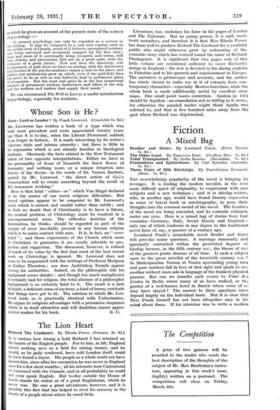The Lion Heart
Richard The Lionheart. By Rhoda Power. (Putnam. 3s. 6d.) Jr is curious how strong a hold Richard I has retained on the hearts of the English people. For to him, in life, England meant nothing save as a field for raising money, and he would, as he gaily confessed, have sold London itself, could he have found a buyer. His people as a whole could not have known him, since after his coronation he was never in England save for a few short months ; all his interests were Continental or concerned with the Crusade, and in all probability he could not even speak English. But to-day outside the House of Lords stands his statue as of a great Englishman, which he never was. He was a great adventurer, however, and it is Possibly this fact that has helped to rivet his memory in the hearts of a people about whom he cared little. Literature, too, enshrines his fame in the pages of Ivanhoe and The Talisman. But no young person, it is said, reads Scott nowadays, and therefore it is that Miss Rhoda Power has done well to produce Richard The Lionheart for a youthful public who might otherwise grow up unknowing of the romantic story which has centred round the name of Richard Plantagenet. It is significant that two pages only of this little volume are considered sufficient to cover Richard's doings in England ; the rest is devoted to his daring exploits in Palestine and to his quarrels and imprisonment in Europe. The narrative is picturesque and accurate, and the author has wisely chosen to make use in it of extracts from con- temporary chroniclers—especially Moslem historians, while the whole book is made additionally useful by excellent clear maps. One small point wants correction. Apuleia (p. 147) should be Aquileia—an emendation not so trifling as it seems, for otherwise the puzzled reader might think Apulia was referred to, and that is five hundred miles away from the spot where Richard was shipwrecked.











































 Previous page
Previous page